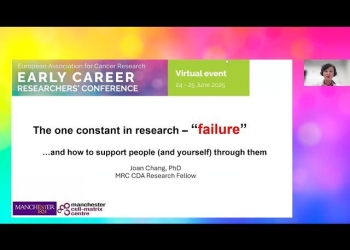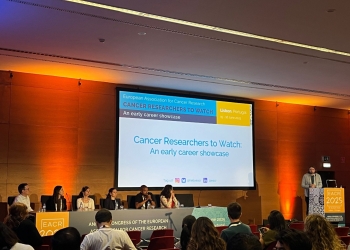The EACR’s ‘Highlights in Cancer Research’ is a regular summary of the most interesting and impactful recent papers in cancer research, curated by the Board of the European Association for Cancer Research (EACR).
The list below appears in no particular order, and the summary information has been provided by the authors unless otherwise indicated.
Use the dropdown menu or ‘Previous’ and ‘Next’ buttons to navigate the list.
Li, Z. et al. Nature Cancer. 5, 167–186 (2024).
doi: 10.1038/s43018-023-00672-2.
 Summary of the findings
Summary of the findings
Tumor growth mirrors aspects of fetal development, particularly in the adaptability of cells and how tissues expand. In previous research, the authors identified similarities between the tumor microenvironment (TME) in hepatocellular carcinoma (HCC) and fetal liver development. They referred to the process where non-cancerous cells, such as FOLR2+ tumor-associated macrophages (TAM) and PLVAP+ endothelial cells (EC) in the TME, undergo reprogramming similar to fetal development as ‘oncofetal reprogramming’.
In this article, the authors identified five subpopulations of cancer-associated fibroblasts (CAF) in HCC, among which the POSTN+ extracellular matrix (EM) CAF shared significant transcriptomic similarities to fibroblasts in the human fetal liver. Interactome analysis and spatial transcriptomics data revealed the co-localization and close crosstalk among the three oncofetal cell types, POSTN+ CAF, PLVAP+ EC, and FOLR2+ TAM. Furthermore, patients with a higher enrichment of oncofetal components in pre-treatment HCC tumors were more likely to experience early relapse after surgical resection compared to those with a less pronounced oncofetal ecosystem. Notably, the oncofetal signatures differentiated tumor cells in HCC patients into two distinct relapse patterns: one dominated by EMT-like reprogramming and the other characterized by an upregulated lipid metabolism program. Lastly, this study established connections between an enriched oncofetal ecosystem, elevated atezolizumab (anti-PD-L1) + bevacizumab (anti-VEGF) response signature (ABRS), increased Treg signature, and improved progression-free survival.










